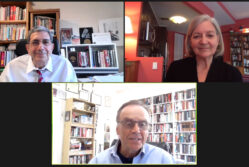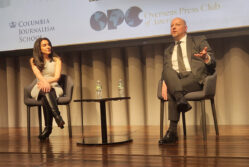
Shaking Conventional Wisdom When Reporting on Pakistan
Video from this event is available at http://youtube.com/opcofamerica
Malala was hardly mentioned.
That was one surprise at the OPC’s February 11 program on covering Pakistan. Organizer, moderator and OPC board member Azmat Khan encouraged the panelists at the event, held at The George Washington University in Washington, D.C., to talk about underreported stories from the tumultuous country. And the tale of Malala Yousafzai, the girl from the Swat Valley who was shot and almost killed by the Taliban for speaking out in favor of schooling for girls, is anything but underreported.
The star of the evening was Declan Walsh, the Pakistan reporter for The New York Times, who flew in for the program from London. Last May he wrote a series for The Times on a trip he took across Pakistan by rail, in order “to look at the country through a new lens.” The underreported story he found is that the once-glorious Pakistani rail system is a wreck, and a symbol of the larger deterioration of infrastructure that is crippling the Pakistani economy. The 5,000 miles of rail, built by the British, once united the country, carried its goods to world markets and was at the heart of a vibrant economy. Now it is plagued with unusable track, decrepit cars and locomotives that can barely make it over the next rise. The railroad and its workers are a burden rather than a boon for a creaking economy. Most Pakistani travelers take the bus.
Walsh’s second underreported story concerned Baluchistan, the huge province that has been in revolt against the government for years — an uprising that has largely gone unreported because “there is no Taliban angle, no Afghan angle,” Walsh said. The global press’s lack of interest, he said, has allowed atrocities by both insurgents and the army Frontier Corps to go on unreported.
Another daily journalist on the panel was Richard Leiby, who was a reporter in Pakistan for The Washington Post in 2012 and 2013 and now lectures at GWU. He called Pakistan “an amazing and terrifying place.” One frightening character Leiby wrote about while there was a radical clergyman named Hafiz Mohammed Saeed, the founder of Lashkar-i-Taiba, the group held responsible for the 2008 attack in Mumbai that killed 166 people, and on whose head the U.S. has put a $10 million bounty. The underreported story that Leiby wrote for The Post: what makes a terrorist? For it happens that Saeed has a brother, Masood, also a clergyman, who spent years in the Boston area working with local religious groups, including Jews, to encourage religious tolerance.
Two panelists were U.S. filmmakers, both with Pakistani roots. Habiba Nosheen is an OPC award winner who spent five years making the film “Outlawed in Pakistan,” which examines the Pakistani justice system through a rape case. Sadia Shepard’s “The Other Half of Tomorrow” is a series of short films that looks at women in Pakistan society. What may surprise viewers of Habiba’s film is that she had full cooperation of the four men accused of the rape and how she came away from the project, “without really knowing what happened.” What is known is that rape accusations rarely result in convictions and, so far, neither has this one.
Shepard’s film is a joyous exploration of the many roles women play in the country’s diverse society. She shows women dancers, poets, cricket players and members of the women’s national guard. One focus is on a brave woman who runs a program that opposes honor killings of women that continue to afflict Pakistani society. She boldly travels around the region where she lives getting women together for songfests in which they chant that there is no honor in honor killings.
Writing the truth about Pakistani society isn’t always tolerated. Days before his railroad odyssey was published, Walsh was expelled. Until recently he was still The Times’ Pakistan reporter but working his sources from London. He is now on leave writing a book.
Event funding was part of the Ford Foundation to extend the OPC mission to a wider audience.
Michael Serrill is president of the OPC.



